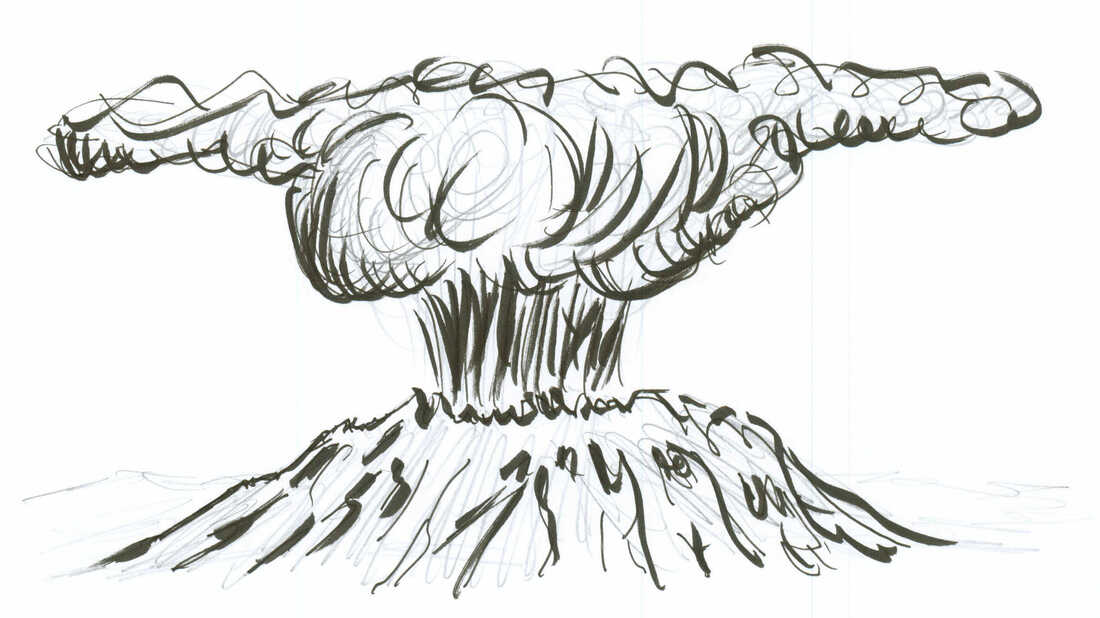How Climate Change Would Cause Ice Age Animals To Go Extinct

Add all of us upward, all 7 billion human beings on globe, and clumped together we weigh roughly 750 billion pounds. That, says Harvard biologist E.O. Wilson, is more than than 100 times the biomass of whatever large animal that's always walked the Earth. And nosotros're still multiplying. Most demographers say we will hit ix billion earlier we summit, and what happens then?
Well, we've waxed. Then nosotros tin wane. Let's just hope we wane gently. Because once in our history, the world-wide population of homo beings skidded and so sharply we were down to roughly a g reproductive adults. One study says we hit as depression as 40.
Forty? Come on, that tin can't be right. Well, the technical term is twoscore "convenance pairs" (children non included). More probable in that location was a desperate dip and so 5,000 to 10,000 bedraggled Human sapiens struggled together in lamentable lilliputian clumps hunting and gathering for thousands of years until, in the late Stone Age, we humans began to recover. But for a time in that location, says science author Sam Kean, "We damn most went extinct."
I'd never heard of this nigh-blinking-out. That's because I'd never heard of Toba, the "supervolcano." It's non a myth. While details may vary, Toba happened.
Toba, The Supervolcano
In one case upon a time, says Sam, around 70,000 B.C., a volcano chosen Toba, on Sumatra, in Indonesia went off, blowing roughly 650 miles of vaporized rock into the air. Information technology is the largest volcanic eruption we know of, dwarfing everything else...

That eruption dropped roughly 6 centimeters of ash — the layer tin can still be seen on land — over all of South Asia, the Indian Bounding main, the Arabian and South Mainland china Body of water. Co-ordinate to the Volcanic Explosivity Index, the Toba eruption scored an "8", which translates to "mega-jumbo" — that's 2 orders of magnitude greater than the largest volcanic eruption in historic times at Mount Tambora in Indonesia, which caused the 1816 "Twelvemonth Without a Summer" in the northern hemisphere.
With so much ash, grit and vapor in the air, Sam Kean says it's a safe judge that Toba "dimmed the sun for six years, disrupted seasonal rains, high-strung off streams and scattered whole cubic miles of hot ash (imagine wading through a giant ashtray) across acres and acres of plants." Berries, fruits, trees, African game became scarce; early humans, living in Eastward Africa only across the Indian Body of water from Mount Toba, probably starved, or at least, he says, "Information technology'southward not hard to imagine the population plummeting."
Then — and this is more than a conjectural, based on arguable prove — an already cool World got colder. The globe was having an ice age 70,000 years ago, and all that dust hanging in the atmosphere may take bounced warming sunshine back into space. Sam Kean writes "At that place'due south in fact evidence that the boilerplate temperature dropped 20-plus degrees in some spots," after which the great grassy plains of Africa may have shrunk way dorsum, keeping the small bands of humans small-scale and hungry for hundreds, if not thousands of more years.
So we well-nigh vanished.
Simply now we're dorsum.
It didn't happen right abroad. Information technology took almost 200,000 years to achieve our first billion (that was in 1804), simply now we're on a fantastic growth spurt, to 3 billion by 1960, another billion most every 13 years since then, till by October, 2011, nosotros zipped by the vii billion marker, says writer David Quammen, "like information technology was a "Welcome to Kansas" sign on the highway."
In his new book Spillover, Quamman writes:
We're unique in the history of mammals. We're unique in this history of vertebrates. The fossil tape shows that no other species of large-bodied beast — above the size of an ant, say or an Antarctic krill — has ever achieved annihilation like such abundance every bit the affluence of humans on Earth correct at present.
But our looming weight makes us vulnerable, vulnerable to viruses that were one time isolated deep in forests and mountains, but are now bumping into humans, vulnerable to climate change, vulnerable to armies fighting over scarce resources. The lesson of Toba the Supervolcano is that there is null inevitable about our domination of the globe. With a little bad luck, we tin can go too.
Nosotros in one case most did.
Radiolab regular Sam Kean's new book on genetics, The Violinist's Thumb, tells the story of Toba, the supervolcano, to explore how human being genes record a "bottleneck" or a drastic narrowing of genetic diversity lxx,000 years ago. David Quammen'due south new book Spillover is about people pushing into forests, swamps and places where viruses have been hiding. Those viruses are now beginning to cross over into horses, pigs, bats, birds and, inevitably, they threaten to "spillover" into us. For a virus, or bacteria, vii billion potential hosts look like a fantastic opportunity.
Source: https://www.npr.org/sections/krulwich/2012/10/22/163397584/how-human-beings-almost-vanished-from-earth-in-70-000-b-c
Posted by: robertslethed.blogspot.com

0 Response to "How Climate Change Would Cause Ice Age Animals To Go Extinct"
Post a Comment